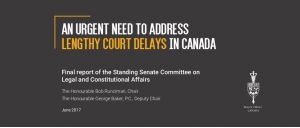 Stigma and Social Exclusion
Stigma and Social Exclusion
The language used to describe people with mental health issues matters. “The mentally ill” is more likely to feed and inflame stereotypes than the ‘people first’ language I am using. There are, of course, myriad options and preferences. “People with lived experience” is currently popular in Canada.

 Social Issues: At the Crossroads of Mental Illness and the Law
Social Issues: At the Crossroads of Mental Illness and the Law Law and Happiness: Challenges and Opportunities to Improving Lawyer and Student Well-Being
Law and Happiness: Challenges and Opportunities to Improving Lawyer and Student Well-Being Program Report: Defining Cultural and Religious Diversity in the Administration of Justice: Are There Different Perspectives? (Panel No. 1)
Program Report: Defining Cultural and Religious Diversity in the Administration of Justice: Are There Different Perspectives? (Panel No. 1) Shaping Justice Together
Shaping Justice Together Imagine for a moment…
Imagine for a moment… Summary of the Senate Committee Final Report: “Delaying Justice is Denying Justice”
Summary of the Senate Committee Final Report: “Delaying Justice is Denying Justice” Fairness, Principles and Standard of Review: Where are we?
Fairness, Principles and Standard of Review: Where are we? Panorama of the Commonwealth Association of Legislative Counsel 2017 Conference (Melbourne-Sydney)
Panorama of the Commonwealth Association of Legislative Counsel 2017 Conference (Melbourne-Sydney) Administrative Law and the Rise of Populism
Administrative Law and the Rise of Populism